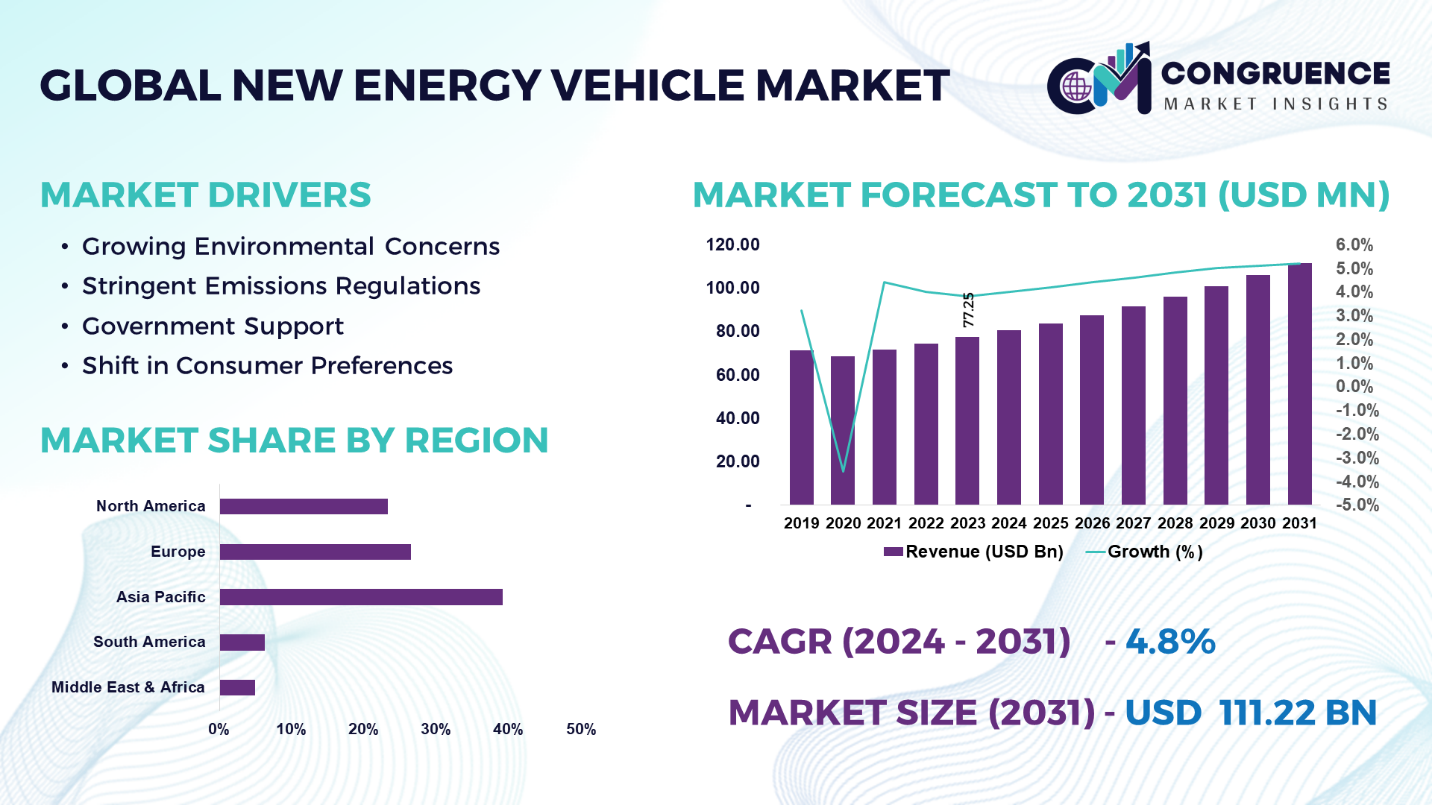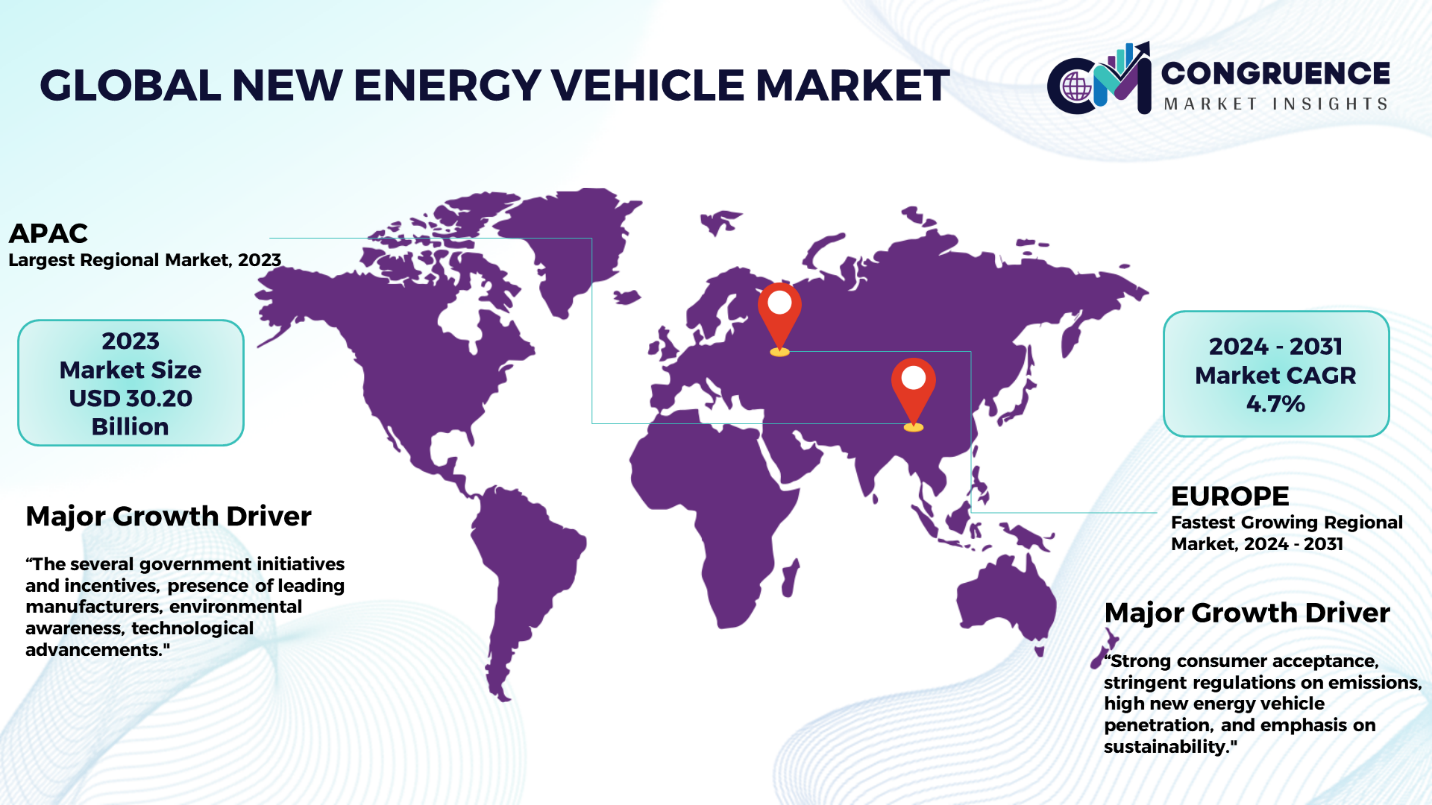Reports
The Global New Energy Vehicle Market was valued at USD 77.25 Billion in 2023 and is anticipated to reach a value of USD 111.22 Billion by 2031 expanding at a CAGR of 4.8% between 2024 and 2031.
A new energy vehicle is a type of vehicle that are fueled by an uncommon energy source instead of conventional internal combustion engines. These vehicles are either partially or fully powered by electricity. New energy vehicles run on electric motors that need to have a constant supply of energy from batteries. These vehicles use unconventional fuel as the power source for operating where advanced technology is integrated. Based on vehicle type, the market is classified into Battery Electric Vehicles (BEVs), Plug-in Hybrid Electric Vehicles (PHEVs), Hybrid Electric Vehicles (HEVs), and Fuel Cell Electric Vehicles (FCEVs). Major benefits offer by new energy vehicles are reduced emissions, lower operating costs, improved efficiency, advanced battery technology, and quieter operation. The market is influenced by factors such as growing environmental concerns, stringent emissions regulations, government support, and shift in consumer preferences. New energy vehicles are used for personal use, commercial use, and for specific applications.

To learn more about this report, request a free sample copy
New Energy Vehicle Market Major Driving Forces
Growing Environmental Concerns: The increasing awareness about environmental concerns drive the shift towards new energy vehicles. New energy vehicles produce little to no tailpipe emissions when running on electricity, contributing to the market growth.
Stringent Emissions Regulations: Governments are implementing stricter emissions standards, particularly for vehicle manufacturers. These regulations encourage the production of natural energy vehicles and push manufacturers to invest in electric drivetrains and improve the overall fuel efficiency of vehicles.
Government Support: Governments across the globe are playing a crucial role in promoting natural energy vehicles adoption through various subsidies and regulations. Moreover, governments provide financial incentives to reduce the upfront cost of purchasing natural energy vehicle aim to accelerate the transition to cleaner transportation.
Shift in Consumer Preferences: The market is being driven by shift in consumer preferences towards sustainable transportation. Consumers are increasingly becoming more environmentally conscious and are driving adoption of cleaner transportation, such as natural energy vehicles.
New Energy Vehicle Market Key Opportunities
Growing Focus on Sustainability: Increasing focus on sustainable transportation practices fuels the demand for efficient and environmentally friendly vehicles. Consumers are increasingly prioritizing sustainability options to reduce greenhouse gas emissions New energy vehicles offer an alternative that aligns with these sustainability goals.
Technological Advancements: Continuous advancements in battery technology, charging infrastructure, and electric drivetrains are anticipated to create numerous opportunities for market growth. These advancements aim at making natural energy vehicles more efficient, cost-effective, and practical for consumers. Improvements in battery technology have led to increased energy density, longer driving ranges, and faster charging times.
Market Expansion: Expanding new energy vehicle market into emerging nations are expected to create significant opportunities for manufacturers to extend their presence. Moreover, the market has a lot of potential in developing countries owing to rising incomes, rapid urbanization, and increasing environmental awareness in these countries.
New Energy Vehicle Market Key Trends
· Growing awareness of the environmental impact of traditional fossil fuel vehicles is a significant factor propelling the growth of new energy vehicle market
· Continuous advancements in battery technology, charging infrastructure, and design are leading to higher energy density, cost-effectiveness, and faster charging times
· The significant rise of battery electric vehicles is a dominant force in the new energy vehicle market
· The integration of autonomous driving capabilities with new energy vehicles for smart, self-driving electric vehicles
· The growing emphasis on expanding public charging infrastructure to address range anxiety and improve convenience
· The adoption of new technologies such as 5G and artificial intelligence (AI) for ensuring safety and enhancing efficiency have been a major trend in the market
· The growing preference for fuel-efficient and low emission vehicles is influencing the demand for new energy vehicles
Region-wise Market Insights
Asia Pacific accounted for the largest market share at 39.1% in 2023 whereas, Europe is expected to register the fastest growth, expanding at a CAGR of 4.7% between 2024 and 2031.

To learn more about this report, request a free sample copy
Asia-Pacific is expected to witness significant growth during the forecast period due to the several government initiatives and incentives, presence of leading manufacturers, environmental awareness, technological advancements. In North America, the demand is driven by stringent emission regulations, significant investment in expanding charging infrastructure, government support, and focus on reducing greenhouse gas emissions. In Europe, the market is characterized by strong consumer acceptance, stringent regulations on emissions, high new energy vehicle penetration, and emphasis on sustainability. The Middle East and Africa has been witnessing a growing demand for new energy vehicles due to growing interest in NEVs, whereas, in South America, the market is influenced by economic factors, with increase in adoption of new energy vehicle supported by government initiatives.
Market Competition Landscape
The global new energy vehicle market is characterized by intense competition among a large number of leading players. Key players in the new energy vehicle market have adopted various business strategies aimed at gaining a competitive edge. These strategies include product innovation, design differentiation, and the incorporation of sustainable and eco-friendly materials to meet evolving consumer preferences. Established brands leverage their reputation for quality and reliability to maintain market share, while newer entrants focus on disruptive innovations and unique selling propositions.
Key players in the global new energy vehicle market implement various organic and inorganic strategies to strengthen and improve their market positioning. Prominent players in the market include:
· Tesla, Inc.
· BYD
· General Motors
· Hyundai Motor India
· BMW AG
· Volkswagen
· Ford Motor Company
· Toyota Kirloskar Motor
· Nio Inc.
· Nissan Motor Corporation
· Mercedes-Benz Group AG
· Rivian Automotive, Inc.
· SAIC Motor Corporation Limited
· Daimler AG
· Lucid
|
Report Attribute/Metric |
Details |
|
Market Revenue in 2023 |
USD 77.25 Billion |
|
Market Revenue in 2031 |
USD 111.22 Billion |
|
CAGR (2024 – 2031) |
4.8% |
|
Base Year |
2023 |
|
Forecast Period |
2024 – 2031 |
|
Historical Data |
2019 to 2023 |
|
Forecast Unit |
Value (US$ Mn) |
|
Key Report Deliverable |
Revenue Forecast, Growth Trends, Market Dynamics, Segmental Overview, Regional and Country-wise Analysis, Competition Landscape |
|
Segments Covered |
· By Vehicle Type (Battery Electric Vehicles (BEVs), Plug-in Hybrid Electric Vehicles (PHEVs), Hybrid Electric Vehicles (HEVs), and Fuel Cell Electric Vehicles (FCEVs)) · By Battery Type (Lithium-ion Batteries, and Solid-State Batteries) · By Power Source (Electric Batteries, and Hydrogen Fuel Cells) · By Application (Personal Use, Commercial Use, and Others) |
|
Geographies Covered |
North America: U.S., Canada and Mexico Europe: Germany, France, U.K., Italy, Spain, and Rest of Europe Asia Pacific: China, India, Japan, South Korea, Southeast Asia, and Rest of Asia Pacific South America: Brazil, Argentina, and Rest of Latin America Middle East & Africa: GCC Countries, South Africa, and Rest of Middle East & Africa |
|
Key Players Analyzed |
Tesla, Inc.,BYD,General Motors,Hyundai Motor India,BMW AG,Volkswagen,Ford Motor Company,Toyota Kirloskar Motor,Nio Inc.,Nissan Motor Corporation,Mercedes-Benz Group AG,Rivian Automotive, Inc.,SAIC Motor Corporation Limited,Daimler AG, and Lucid |
|
Customization & Pricing |
Available on Request (10% Customization is Free) |
